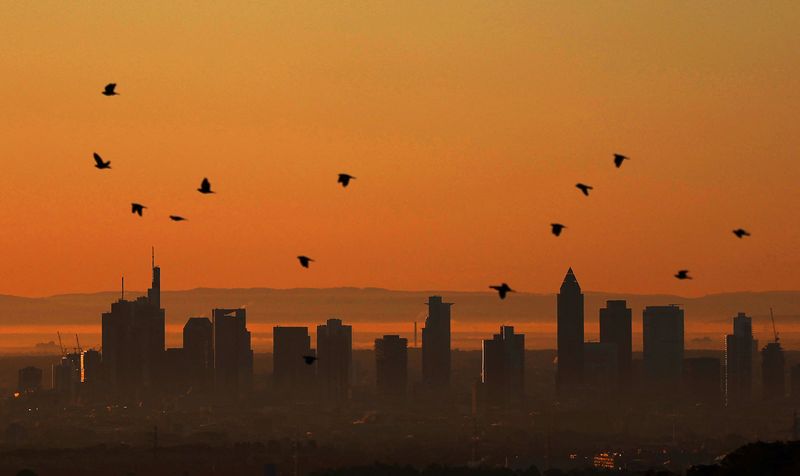German economy skirts recession, but just for now

FILE PHOTO: Birds are seen over the skyline as the sun rises in Frankfurt, Germany, September 22, 2022. REUTERS/Kai Pfaffenbach
By Maria Martinez
BERLIN (Reuters) -The German economy stagnated in the first quarter, as a decline in government and household consumption was balanced out by an increase in exports and capital investment, data showed on Friday.
Gross domestic product was unchanged quarter on quarter in adjusted terms, the federal statistics office said. A Reuters poll of analysts had forecast growth of 0.2%.
Detailed results for the first quarter will be released by the statistics office on May 25.
«The German economy remained stuck in the mud at the start of 2023, only barely avoiding recession,» Pantheon Macroeconomics’ chief eurozone economist Claus Vistesen said.
The German economy shrank by a revised 0.5% in the fourth quarter of 2022 compared with the previous three months, reviving fears of a technical recession, defined as two consecutive quarters of contraction.
«With the outturn for the fourth quarter also revised down, that left the economy broadly in line with its pre-pandemic level, while GDP is significantly above that mark in Italy and France,» Capital Economics’ senior Europe economist Franziska Palmas said.
The German government raised its economic growth forecast for this year to 0.4% from a previously predicted 0.2%, according to its spring economic projections published on Wednesday.
«A gradual recovery is underway, despite a persistently difficult environment,» German Economy Minister Robert Habeck said in the presentation of the forecasts. He expects an acceleration in growth after the first quarter.
But economists warn that the euro zone’s largest economy hasn’t escaped the risk of a recession yet.
«The recent renaissance in industrial production could very well carry the economy through the second quarter,» ING’s global head of macro Carsten Brzeski said. «However, we are afraid that looking into the second half of the year, the German economy will continue its flirtation with recession.»
In the second half of the year, the industrial backlog will have been reduced without new strong demand coming in, the impact of the most aggressive monetary policy tightening in decades will fully unfold and a slowdown of the U.S. economy will hit German exports, Brzeski said.
«A technical recession in the winter half-year is off the table for the time being. However, we advise caution regarding the second half of the year,» Commerzbank (ETR:CBKG) senior economist Joerg Kraemer said.
Kraemer is worried about the European Central Bank’s sharp rise in interest rates. «In the past, such rate hikes have always been followed by recessions in Germany,» Kraemer said.




